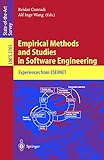Empirical Methods and Studies in Software Engineering [electronic resource] : Experiences from ESERNET /
Material type: TextSeries: Lecture Notes in Computer Science ; 2765Publisher: Berlin, Heidelberg : Springer Berlin Heidelberg : Imprint: Springer, 2003Edition: 1st ed. 2003Description: VIII, 284 p. online resourceContent type:
TextSeries: Lecture Notes in Computer Science ; 2765Publisher: Berlin, Heidelberg : Springer Berlin Heidelberg : Imprint: Springer, 2003Edition: 1st ed. 2003Description: VIII, 284 p. online resourceContent type: - text
- computer
- online resource
- 9783540451433
- 005.1 23
- QA76.758
Method Chapters -- Empirical Research Methods in Software Engineering -- Challenges and Recommendations When Increasing the Realism of Controlled Software Engineering Experiments -- Empirical Studies in ESERNET -- Software Engineering Knowledge Repositories -- Using Empirical Studies during Software Courses -- Practical Experiences in the Design and Conduct of Surveys in Empirical Software Engineering -- Experience Chapters -- Post Mortem – An Assessment of Two Approaches -- Evaluating Checklist-Based and Use-Case-Driven Reading Techniques as Applied to Software Analysis and Design UML Artifacts -- Effectiveness of Code Reading and Functional Testing with Event-Driven Object-Oriented Software -- Experimentation with Usage-Based Reading -- Functional Testing, Structural Testing and Code Reading: What Fault Type Do They Each Detect? -- COTS Products Characterization: Proposal and Empirical Assessment -- Reuse Based Software Factory -- Appendix and Author Index -- Appendix – Glossary.
Nowadays, societies crucially depend on high-quality software for a large part of their functionalities and activities. Therefore, software professionals, researchers, managers, and practitioners alike have to competently decide what software technologies and products to choose for which purpose. For various reasons, systematic empirical studies employing strictly scientific methods are hardly practiced in software engineering. Thus there is an unquestioned need for developing improved and better-qualified empirical methods, for their application in practice and for dissemination of the results. This book describes different kinds of empirical studies and methods for performing such studies, e.g., for planning, performing, analyzing, and reporting such studies. Actual studies are presented in detail in various chapters dealing with inspections, testing, object-oriented techniques, and component-based software engineering.


There are no comments on this title.